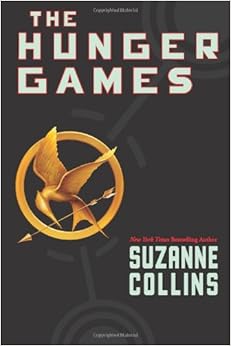 Its not easy to live in District 12. The Capitol of Panem makes sure of that. Because if it were easy or even a little more convenient to simply survive, there may be an uprising of people who think they deserve things like sufficient food, comfortable shelter and a decent way to make a living. In a word, Freedom. These are the things Katniss can only hope for. Instead of sufficient food, she has resorted to passing under the electrified fence surrounding District 12 and hunting in the meadow and forest, with her best-guy-friend, Gale. She's able to take home and enjoy some of the animals, roots and herbs she gathers and the rest she sells for money to buy other items her family (consisting of her mother and younger sister) needs.
Its not easy to live in District 12. The Capitol of Panem makes sure of that. Because if it were easy or even a little more convenient to simply survive, there may be an uprising of people who think they deserve things like sufficient food, comfortable shelter and a decent way to make a living. In a word, Freedom. These are the things Katniss can only hope for. Instead of sufficient food, she has resorted to passing under the electrified fence surrounding District 12 and hunting in the meadow and forest, with her best-guy-friend, Gale. She's able to take home and enjoy some of the animals, roots and herbs she gathers and the rest she sells for money to buy other items her family (consisting of her mother and younger sister) needs.But even then, there are still things like grain, oil, and heat, to name a few, that her hunting does not provide for. To make up for this lack, she must enter her name more than once in the pool to be picked as a tribute to represent their District in the Hunger Games. Each district is required to send 2 tributes, a boy and a girl, each year. The Capitol sponsors the Hunger Games as a way to remind the citizens of Panem how lucky they are to have a government (corrupt as it is) that protects them and controls them. And the Hunger Games drives that home in a truly vicious and cruel way. Each tribute, 24 in all, is placed in an "arena" several acres large and they fight to the finish, to the death, on live TV. The citizens are required to watch their children battle it out. The winner will never go hungry again. Reality TV at its worst. And this is the story of Katniss, who finds herself in the middle of the game, an unintended contender, who could possibly win. But does she want to? Can she do what has to be done to win?
As you might assume, this novel is exciting, gripping, and violent. It is set in a post-apocolyptic world, where the Capitol has replaced the government of North America. Suzanne Collins mixes famileal love, friendship, romantic love, self-love and violence in a way that immediately engages us. Should I admit at this point that I enjoyed reading it? Because I did. It was a quick read, one that I didn't have to think about (i.e. not deep, kind of like "Twilight"). It kept moving along at a quick pace and the action was always driving me to read 'just one more chapter.' A really great adventure and an interesting look at an alternative future.
I really enjoyed this book. Katniss is a likable character who steps up to the responsibilities given her, both in her village as well as in the Hunger Games arena. The point is well taken about the pitfalls of reality TV and desensitization, a close parallel to our society today. My only peeve is the ending that clearly sets us up for the next book in the trilogy, which doesn't come out until September. I'll be ready when it does.
A note on the violence: The violence was nothing worse than what is seen on crime-time dramas nearly every night or most of the action-adventure movies you see in the theater. But after watching a few video interviews with the author, I started to wonder if, in trying to point out the dangers of desensitization, she is actually contributing to the problem. Some of her comments really started to bother me, especially when she talked about the recommended age of readers. You can view these interviews here.
Other apocolyptic, alternative future books: "Brave New World", "Farenheit 451", "1984", "The House of the Scorpion"




